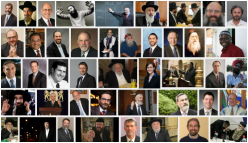|
 I admit to being something of a grammar and syntax nerd. I may not be as expert as a copy editor, but I know when to use a comma, a semi-colon and a period. I am a stickler for subject-verb agreement. I try never to split (as opposed to “to never split”) an infinitive. And I try to be very careful with my language; when I was a pulpit rabbi, I avoided that classic announcement, “Please rise on page 37.” If the congregation had taken me literally, they would have committed the sacrilege of standing upon a sacred book. I was the kid who knew what a collective noun was – a singular noun that stood for a group of individual persons, places or things. It is a word like committee, herd, confederation. A collective noun takes a singular verb and pronoun: The committee is its own worst enemy. Nerditude is hereby confirmed. Because of my grammar-retentiveness, I also enjoyed grammar jokes. The one I remember best – because it spurred me to learn what it meant – was the one in which the teacher asks a student to name a collective noun. The kid replies, “Garbage can.” “Rabbi” is a collective noun in the “garbage can” sense. No one encounters a rabbi with a clean slate. Everyone brings a story (or an anthology) to the meeting. Not all the stories are bad, not all the stories are good and, frankly, not all the stories are true, but they are all there. Some are right up front – I thought he was God, it took me awhile to get used to a “lady rabbi,” the rabbi was so smart but so judgmental. Some stories are symbols of markers on the road of life – the rabbi named me, officiated at my bar/bat mitzvah, married me, buried my grandparents. Some stories are of larger social issues – my rabbi marched with Dr. King; my rabbi is in jail for sexual misconduct; my rabbi is so late-twentieth-century. Not every person I meet has a fixed idea of a rabbi, just as most people have a variegated relationship with Judaism. But everybody has a story. The great challenge in developing a relationship is hearing the story, often when it isn’t being told. Now, that may not be so different than any human encounter, but when it comes to being a rabbi (priest, minister, imam, guru), the stakes are different. Seeping through the human filter is a relationship with the ultimate. I call it “God,” but plenty of people either don’t know what to call their ultimate concern or, on principle, call it not-God. Seminary education tries to instill a sense of authority and expertise in the student. Upon graduating, deeply uncertain that I had either, I discovered that I was presumed to have both. My collective-noun-of-a-title made me Moses, Akiva, Maimonides, Heschel and Wise (Stephen, Isaac and lower-case “w”). Living part-way up to that expectation is exhausting, but figuring out if the person in front of me is seeing a hero or a goat, a guardian or an oppressor, a sage or a sucker is harder. I know I am always someone else reincarnated, but I don’t know whether my past life is being promoted or punished in me. A rabbi who chooses learning or teaching as a path may have a little less of it, but nobody, not even the guy who inspects the lungs of kosher-slaughtered animals, can avoid it. My teacher, Rabbi Jack Bloom, who was recently called to his eternal reward, called it being a “symbolic exemplar.” All of that focus on me is beside the point. Nobody really cares. I got in a lot of trouble for saying that somewhat ineloquently toward the end of my congregational tenure, but it is true. Just as the customer service rep doesn’t get to say, “I had a bad night’s sleep, so you’ll be on hold for an extra 20 minutes,” the rabbi doesn’t get to say, “What about me?” when an unexpected death, an existential crisis or a sudden urge to know the Biblical reading for a bar mitzvah thirty years ago arises. The rabbi is an idea before she or he is a person. “Rabbi” is a collective noun into which his or her own conception of self too often disappears to everyone outside a tight and intimate circle. That’s what you sign up for when you accept your ordination. And in the end, the best you can hope for is not to poison the well for the next rabbi. I guess I should add an acknowledgment of the cynicism you might read into these words. On the contrary, I hope you see the realism that affirms what you, the reader (including the reader who is a rabbi or other clergy) bring to every conversation. There may be a few renegade rabbis who are in it for the power or the glory, but even the worst among us are, first and foremost, servants of the Holy One of (whichever) blessed name. We recognize that spark in you and try to hear it tell your story to the collective noun that is our sacred task.
0 Comments
Leave a Reply. |
AuthorI spent 35 years in the pulpit and learned a few things about the people and the profession Archives
July 2023
Categories |
 RSS Feed
RSS Feed
